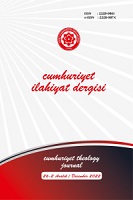Endülüs Şiirinde Hz. Peygamber Methiyeleri
Eulogies to the Prophet Muḥammad in Andalusian Poetry
Author(s): Harun ÖzelSubject(s): Cultural history, History of Islam, Theory of Literature, History of Religion, Sociology of Literature
Published by: Cumhuriyet Üniversitesi İlahyat Fakültesi
Keywords: Arabic Language and Eloquence; Muḥammad (pbuh); Andalusian Poetry; Eulogy; Nabawī Madiḥ; Ibn al-Jannān;
Summary/Abstract: The first eulogies (Qaṣāīd) about the Prophet Muḥammad (pbuh) appeared when he was still alive. Ḥassān ibn Thābit (d. 60/680 [?]), ʿAbd Allāh b. Rawāḥa (d. 8/629) and Kaʿb b. Mālik (d. 50/670), important Muslim poets of the period, praised the Prophet and inspired future generations of poets. Depending on the developments in the following centuries, there had been a great increase in the number of poems sung to express enthusiastic feelings towards the Prophet and to defend him and his Prophethood. Andalusia is one of the places where this genre increased the most. The first examples of the praise of the Prophet appeared in Andalusia during the Mulūk al-Ṭawāʾif period (1031-1090). The praises of the Prophet, which were processed in the poems of asceticism, dirge and elegy until the end of the 5th/11th century, became an independent genre called al-Madāʾiḥ alNabawiyyah/Nabawiyyāt thanks to the ever-increasing Ṣūfī thoughts penetrating literary circles. The turning point of the praise of the Prophet in Andalusia, as in the East, is the period of the The Almohads (1147-1238), which coincides with the 7th/13th century. The mawlid celebrations, which were first initiated by the Fāṭimids in the 4th/10th century to give legitimacy to their rule, and held every year in North Africa on the twelfth of the month of Rabi'ulawwal, moved to Andalusia at the end of the The Almohad period and gradually became one of the largest official and religious holidays in Andalusia. Giving awards to high-quality poems read on the mawlid festival and celebrations made all over Andalusia has greatly contributed to the literary richness in this field. In praise of the Prophet, talented poets such as Abū Zayd al-Fāzāzī (d. 627/ 1230), Ibn al-Jannān al-Anṣārī (d. 650/1252), Ibn Jābir (d. 780/1378) and Ibn Zumruk (d. 797/1395) emerged. Abū Zayd al-Fāzāzī, one of the most distinguished Prophetic ode poets of the Almohad period is said to have first pioneered the spread of Prophetic praises in Andalusia before the Iraqi poet Yaḥyā al-Ṣarṣarī (d. 656/1258) and the Egyptian poet Būṣīrī (d. 695/1296). He has a dīvān called al-Wasā’il al-mutaqabbalah, which he wrote in alphabetical order and dedicated to the praise of the Prophet. The fame of the odes he uttered about the Prophet spread as far as North Africa, and it has become a tradition to read his odes on special days. Because of the abundance and quality of Prophetic odes, Ibn al-Jannān, who witnessed the glorious days and the collapse of the The Almohad state, also commemorated the poet Ḥassān ibn Thābit, The Prophet’s Odic Poet. Ibn Jābir al-Andalusī, on the other hand, wrote the second ode in this field after Ṣafī al-Dīn al-Ḥilli (d. 749/1348), the inventor of the axiomatic odes, and became the pioneer of axiomatic odes in Andalusia. The effect of political instability on Prophetic odes in Andalusia, which entered its collapse with the end of the Almohad state, is obvious. According to many poets, salvation from this plight of Muslims in Andalusia is possible by once again adhering to the Sunnah of the Prophet. Probably as a reflection of this idea, many poets from 7th/13th centuries onwards devoted their odes to narrating the Prophet and his Sunnah. Poets who describe the Prophet elaborately in their poems hope to be saved from the troubles they have fallen into and to reach the highest rank in heaven. Poets who touched upon the physical characteristics of the Prophet often likened his smiling face to a bright sun and a full moon. In terms of oratory, they stated that he had a fluent language and never uttered bad words. Andalusian poets, who praised the Prophet with moral virtues such as tolerance, justice and courage, stated that there was nobody more merciful and generous than him due to the abundance of his blessings resembling torrential rain. Andalusian Prophetic ode poets adhered to the traditional forms of Arabic poetry in terms of the structure of eulogy. In the introductory parts of odes, they generally express longing for the Prophet and the holy places. The main theme is mostly the Prophet and his outstanding virtues, and they usually end their eulogies with salutation to the Prophet. Save a few Sufi poets, it can be said that they used simple and understandable language in their poems. The sources of inspiration for their poems are the Qur'an and hadiths. Andalusian poets used non-material axiomatic arts in their poems without disturbing the structure of eulogy. In addition to the art of pun, they provided musicality in the poem with the ‘tent-frame’ meter and rhyme scheme, sometimes supporting it through repetition. It is possible to see all kinds of repetitions in, Ibn al-Jannān's odes. In this study, the place of the Prophet in Andalusia and odes, which are reflections of the love for him, will be examined. In addition, the concept of the Prophet in Andalusia will be explained within the political, social and cultural framework of the period.
Journal: Cumhuriyet İlahiyat Dergisi
- Issue Year: 26/2022
- Issue No: 2
- Page Range: 621-645
- Page Count: 25
- Language: Turkish

